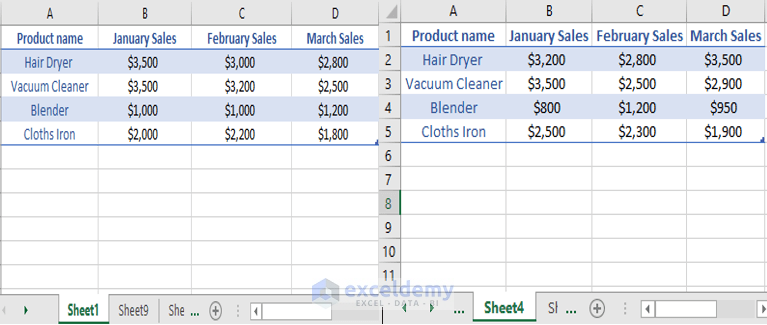5 Easy Ways to Merge Excel Sheets Instantly

Excel is a powerful tool for managing data, but often, you might find yourself needing to combine multiple sheets into one for analysis, reporting, or organizational purposes. Whether you're dealing with sales data, inventory, or any other records, merging sheets can streamline your workflow. In this post, we'll explore 5 easy ways to merge Excel sheets that cater to different levels of Excel proficiency, from beginners to advanced users.
1. Using the Consolidate Tool


The Consolidate tool in Excel is a straightforward way to combine data from multiple sheets. Here’s how to use it:
- Select the cell where you want the consolidated data to appear.
- Go to the Data tab, and click on Consolidate.
- In the Consolidate dialog, choose the function you need (e.g., Sum, Average).
- Select each range of cells from different sheets by clicking the range finder button, and add them to the reference list.
- Click OK, and your data will be merged.
⚠️ Note: The Consolidate tool will not merge formatting, and labels must be identical across sheets for accurate results.
2. Power Query for Data Transformation


Power Query, part of Excel’s Get & Transform Data tools, is ideal for complex merging tasks:
- Go to the Data tab, then click Get Data > From Other Sources > From Excel Workbook.
- Select your Excel file and choose the sheets you want to merge.
- Use Append Queries to combine all selected sheets.
- Transform and load the data back into Excel.
This method is perfect for cleaning and transforming data before merging, offering flexibility not available with simpler methods.
3. VBA Macro for Automation


For users comfortable with macros, VBA offers automation:
Sub MergeSheets() Dim ws As Worksheet Dim targetWs As Worksheet Set targetWs = ThisWorkbook.Sheets.Add(After:=Sheets(Sheets.Count)) targetWs.Name = “MergedData”For Each ws In ThisWorkbook.Worksheets If ws.Name <> "MergedData" Then ws.Rows.Copy Destination:=targetWs.Rows(targetWs.UsedRange.Rows.Count + 1) End If Next ws
End Sub
Run this macro, and all sheets will be appended into a new sheet named “MergedData.”
✏️ Note: Ensure your Excel file has the necessary macro security settings enabled.
4. Manual Copy-Paste Method

If you’re dealing with small datasets or if automation isn’t your forte, manual copy-paste remains effective:
- Select all data from one sheet.
- Copy (Ctrl+C) and paste (Ctrl+V) into the target sheet.
- Repeat for all sheets you need to merge.
5. Third-Party Add-ins

Various Excel add-ins like Ablebits or Kutools provide intuitive interfaces to merge sheets:
- Install the add-in.
- Select the sheets you want to merge.
- Choose settings like column matching and data duplication options.
- Click merge, and the tool does the rest.
💡 Note: Third-party add-ins might have additional costs and could require periodic updates.
In this post, we’ve covered five easy ways to merge Excel sheets that cater to different needs and skill levels. From using built-in Excel tools like Consolidate and Power Query, to leveraging VBA macros or even opting for a straightforward copy-paste or third-party add-ins, there’s a method suited for every user. Remember to consider data consistency, formatting, and the scale of your data when choosing your method. Merging Excel sheets can streamline your data management, saving time and reducing errors when performed correctly.
How do I ensure data consistency when merging multiple Excel sheets?

+
To ensure data consistency, make sure all sheets have identical column headers or labels. Also, consider using Power Query or macros to automate checks for data integrity.
Can I merge sheets from different Excel files?

+
Yes, you can merge sheets from different Excel files using methods like Power Query or by writing a VBA macro to open each file and merge the required sheets.
Are there limitations to the number of sheets I can merge in Excel?

+
Excel has practical limitations based on file size and system performance rather than a set limit on the number of sheets. For large datasets, consider using external database tools or more advanced software like SQL Server for merging.



